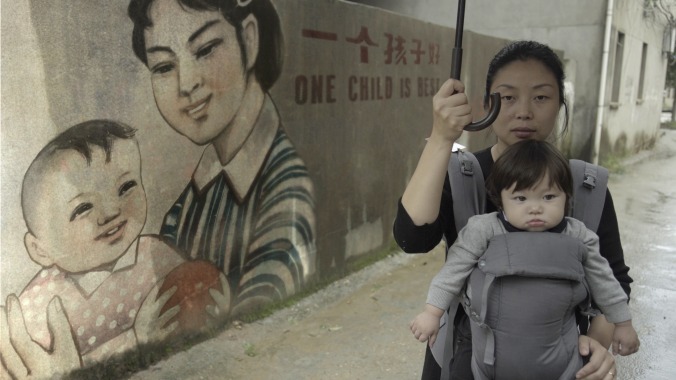In 1979, China launched its one-child policy, which legally prohibited most parents from having more than a single child. A drastic attempt to curb the nation’s urgent population crisis, it would go on to shape an entire generation. The repercussions of the program—still being felt today, both in China and internationally—are the subject of One Child Nation, which won the U.S. Documentary Grand Jury Prize at Sundance earlier this year. As wide-ranging in scope as it is horrifying in its particulars, the film does the necessary work of illuminating, for a large audience, a dark chapter of Chinese history.
Co-directors Nanfu Wang and Jialing Zhang, like the rest of the film’s Chinese crew, belong to a generation with no recollection of a time before the policy. Recognizing that it would be impossible to treat this massive subject with any kind of exhaustiveness, however, they opt to start One Child Nation on a personal level. Although Wang eventually moved to the United States at the age of 26, she was born in rural China in 1985. Accordingly, she still vividly recalls the era’s ubiquitous propaganda—village operas, school songs, signage—that was, for her, merely a part of growing up. One Child Nation’s first half hour or so traces Wang’s return to her home province of Jiangxi in an attempt to excavate both her own memories and those of the adults who lived in China during the one-child era.
Mostly, this comes in the form of frank interviews with former officials and family members, which are by turns revealing, unsettling, and utterly harrowing. One major issue with the one-child rule was that it clashed with most families’ culturally received preference for male children—which in practice led to the abandonment of countless female babies. (Wang’s own mother recalls how she helped her brother leave his newborn daughter to die in the village market.) There’s also, of course, the state’s actual implementation of the one-child program, for which the term draconian seems entirely inadequate. Yuan Huaru, the former midwife of Wang’s village, estimates that she performed about 50,000 to 60,000 forced sterilizations and abortions over her career; the former saw women being tied down and dragged away “like pigs,” while the latter at times involved inducing live births and then killing the babies. And though Yuan is now attempting to “atone for [her] sins” by working as a fertility doctor, her perspective on the era is far from the norm. Recalling the period, Jiang Shuqin, a former family planning official, asserts that “the policy was absolutely correct.” This, despite the fact that when she first started working at the age of 19, she considered the forced abortions an “atrocity.”
Although One Child Nation isn’t exclusively about propaganda, it does demonstrate the Chinese government’s brutal effectiveness at convincing citizens of the policy’s necessity and the Party’s infallibility. Wang’s aunt, who gave up her own child to a human trafficker, remarks that there wasn’t anything to hate about the one-child requirements: “Policy is policy.” The particulars of her case, though, open up the documentary’s scope to encompass China’s corrupt adoption system, which involved taking children from families who violated the policy (and couldn’t pay the arbitrary, exorbitant fines), and then selling them to state-run orphanages, which would put them up for adoption by foreign families led to believe that the babies were either orphaned or abandoned. The issue is one that’s been detailed in written exposés like The Orphans Of Shao, whose author Pang Jiaoming appears in the film. But even in dealing with this massive, nationwide network of fraudulence, Wang and Zhang locate a personal angle through Brian and Long Lan Stuy, a Utah-based couple who adopted three Chinese daughters under the aforementioned assumptions but have since started Research-China, a service aimed at matching Chinese adoptees with their birth parents.
Formally speaking, One Child Nation doesn’t really venture beyond the boundaries of a standard talking-heads documentary. And as it moves among its various threads, you sometimes wish the directors would either scale back their editorializing or just follow a particular subject more exhaustively. (Interviews with former planning officials, doctors, and nurses could likely furnish an entire feature-length documentary—something along the lines of a film by Joshua Oppenheimer.) Clocking in at just 85 minutes, the film is naturally unable to achieve the monumental comprehensiveness of, say, Dead Souls, Wang Bing’s recent, eight-hour documentary about the atrocities committed under China’s Anti-Rightist Campaign. But as the ending of One Child Nation makes explicit, the remnants of the one-child era are already in the process of being erased—and so this film remains a worthwhile oral history all the same.



 Keep scrolling for more great stories from A.V. Club.
Keep scrolling for more great stories from A.V. Club.